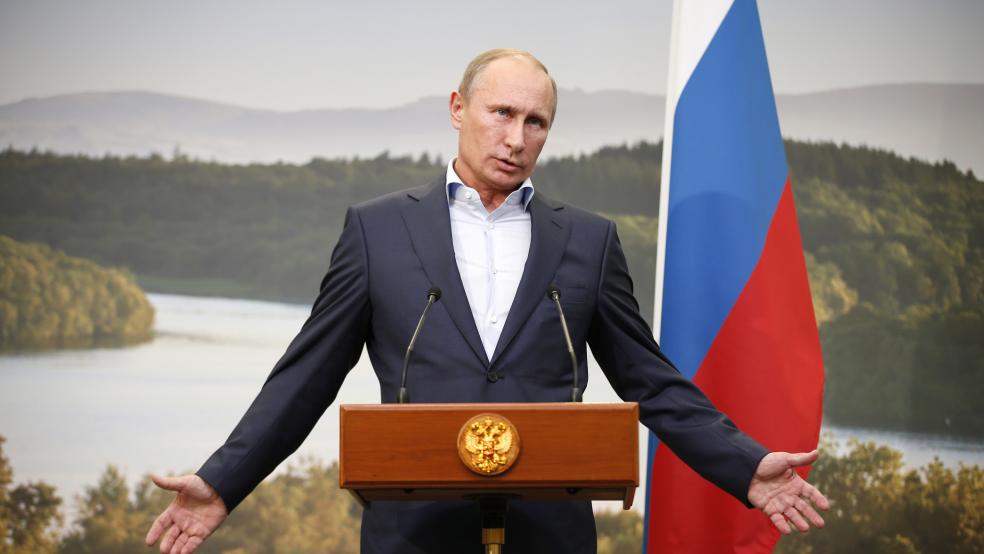Lawmakers are pondering the unthinkable now: Trusting Vladimir Putin.
Just a few weeks ago, the surly Russian president was a Super Bowl ring-stealing kleptocrat who offered safe haven to National Security Agency leaker Edward Snowden.
Now he comes as a peacemaker trying to avert a U.S. attack on Syria in exchange for Syrian President Bashar Hafez al-Assad’s agreement to surrender his chemical weapons stockpile to an international overseer.
Capitol Hill had the look and feel of the United Nations on Tuesday as lawmakers struggled to absorb all the fast-paced international developments and intrigue while Democratic and Republican senators met behind closed doors with President Obama in the run-up to his nationally televised address last night.
During the past several days, it was an article of faith that Congress would reject a joint resolution sought by Obama granting the president approval to launch a limited missile strike against Syrian forces in retaliation for Assad’s use of chemical weapons that killed more than 1,400 men, women and children last month in that country’s civil war.
RELATED: IS PUTIN PLAYING RUSSIAN ROULETTE WITH OBAMA?
The resolution still may go down to defeat, with nearly two thirds of Americans opposed to a U.S. missile strike, according to the latest Washington Post-ABC News poll. But in light of Putin’s olive branch and the Syrian regime’s apparent acquiescence to giving up its chemical weapons, Democrats and Republicans are beginning to see the virtue of using the threat of war to force Syria and Russia to close the deal.
In a shift in tactics, Obama focused his efforts Tuesday on exploring a diplomatic solution that would postpone or negate the need for a U.S. military response to Syria’s use of chemical weapons and asked the Senate to delay a vote on whether to authorize an attack.
The Senate Foreign Relations Committee approved a resolution last week, 10 to 7, granting the president limited authority to launch a strike against Syria. Senate Majority Leader Harry Reid (D-NM) wanted to hold a preliminary vote on the Senate floor Wednesday, but has agreed to postpone action, probably until next week, to give more time to diplomatic maneuvering.
After the Democrats met with Obama yesterday afternoon, Reid told reporters he was dubious Assad could be trusted after the Syrian leader insisted there was no evidence he was responsible for the deadly gas attacks. In an interview this past weekend with Charlie Rose on PBS, Assad even refused to confirm or deny that he had stockpiled chemical weapons.
“For such a diplomatic solution to be possible, the Assad regime must act and act quickly to prove their offer is not merely a ploy to delay military action,” Reid said. He added that the Syrian government must agree to total transparency in the disposition of the chemical weapons. Any attempt by Assad to transfer the deadly chemicals to Hezbollah or other terrorist groups “would be met with a rapid response from this government – and it would be a robust response,” Reid said.
Sen. Ben Cardin (D-MD), a member of the Foreign Relations Committee, said the resolution approved last week “had diplomacy as the first option in it.” Cardin said that the resolution could be tweaked to better clarify what constitutes diplomacy and how it relates to the rest of the resolution authorizing narrowly focused military action.
RELATED: DOES OBAMA LIKE PUTIN MORE THAN REPUBLICANS?
Sen. Sherrod Brown (D-OH), borrowing a phrase from President Ronald Reagan on how to negotiate with the Russians, said, “I think you trust but verify.”
“I think it’s a very real possibility” the U.S. can reach an accord with Syria, Russia and other international players in defusing the crisis and getting the chemical weapons out of the hands of the Assad regime. “It’s a much better solution ultimately if it works because it really does help us eliminate some of these chemicals.”
Yet Brown – like many other Democratic and Republican lawmakers – is reluctant to sign off on a resolution that would authorize a missile strike in the event the negotiations collapse. “I’m concerned because no strike is as precise as the military would like it to be and the State Department would like it to be, and I don’t think it’s clear what happens” after that.
Some lawmakers noted yesterday that the fate of the resolution could be heavily influenced by a host of events in the coming days, including the role of the United Nations, future actions and pronouncements by Russia and Syria, and the involvement of Great Britain, France and other third-country players. “There are a lot of external forces out there,” noted Sen. Chuck Schumer (D-NY).
Senate Republican leader Mitch McConnell of Kentucky yesterday became the first congressional leader to come out against a resolution giving the president authority for limited strikes. "There are just too many unanswered questions about our long-term strategy in Syria."
In another blow to the administration, Democratic Sen. Ed Markey of Massachusetts announced his opposition, saying the resolution was too broad. "The effects of a strike are too unpredictable, and I believe we must give diplomatic measures that could avoid military action a chance to work."
RELATED: HOW RUSSIA OUTFOXED WASHINGTON IN EGYPT
Markey recently won election to succeed Secretary of State John Kerry in the Senate. It was Kerry’s off-the-cuff suggestion on Monday that the Syrian government could avert a U.S. attack by placing its chemical weapons under international control that touched off the subsequent round of high level diplomatic action.
Sen. Bob Corker, one of the few Republicans on the Foreign Relations Committee to support the resolution, told reporters that Obama and Senate Republicans had a “very honest conversation” during their meeting yesterday. Corker insisted “it is very important” that Congress dangle the threat of an attack against Syria to bring Assad and Putin to the bargaining table.
He said it’s likely that the seeds of this new diplomatic initiative were planted by Obama during his talks with Putin at the G20 meeting in Russia last week immediately following the Foreign Relations Committee vote on the war-powers resolution.
“I think it’s very important that that stays on the table while these negotiations are occurring,” Corker said. “Otherwise there will be no negotiations. I mean, it’s just A to B to C.”






